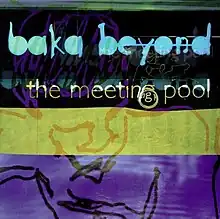| The Meeting Pool | ||||
|---|---|---|---|---|
 | ||||
| Studio album by | ||||
| Released | 1995 | |||
| Label | Hannibal[1] | |||
| Baka Beyond chronology | ||||
| ||||
The Meeting Pool is an album by Baka Beyond, released in 1995.[2][3] It was a collaboration between British musicians and the Cameroonian Baka.[4] Martin Cradick, the founder and guitar player for the group, decided to make a second album after the success of the first, Spirit of the Forest.[5]
The album sold more than 50,000 copies in its first year of release.[6] Cradick set up a foundation to distribute royalties to the Baka people, for the songs that were considered traditional.[7]
Production
The album is based on field recordings made in Cameroon in 1994, with Baka percussionists and vocalists; Cradick then took the recordings to the studio.[8][9] Cradick used more Celtic musical styles, compared to the first album.[10]
Critical reception
| Review scores | |
|---|---|
| Source | Rating |
| AllMusic | |
| The Encyclopedia of Popular Music | |
| MusicHound World: The Essential Album Guide | |
The Toronto Star determined that the attempt "to merge gentle Celtic themes and original music of the Baka people of Cameroon's forests ... just doesn't work."[13] The Santa Fe New Mexican stated: "Occasional Irish overtones emerge from this strange brew; the overall feeling is one of a pulsing dreaminess, grounded by a happy percussive underbeat given heart by recurring female vocal tonings."[14] Music & Media called The Meeting Pool "a lush, complex and richly rewarding album," noting the "beautiful melodies and haunting rhythms."[15]
AllMusic wrote that "Meeting Pool has moments of real piquancy, as on 'Ohureo', a traditional from the Western Isles of Scotland ... This macabre lullaby, dressed up with African drums and [Paddy] LeMercier's fiddle commentary, is achingly entrancing."[11] World Music: Africa, Europe and the Middle East deemed the album "a truly inspired cultural mish mash that defies categorisation."[16]
Track listing
| No. | Title | Length |
|---|---|---|
| 1. | "Woosi" | |
| 2. | "Ancestor's Voice" | |
| 3. | "Lupé" | |
| 4. | "Ohureo" | |
| 5. | "Meeting of Tribes" | |
| 6. | "Journey" | |
| 7. | "Ndaweh's Dream" | |
| 8. | "Booma Lena" |
References
- ↑ Hesmondhalgh, David (October 15, 2000). "Western Music and Its Others: Difference, Representation, and Appropriation in Music". University of California Press – via Google Books.
- ↑ Andrews, Jon (Dec 1995). "Worlds in collision — The Meeting Pool by Baka Beyond". DownBeat. 62 (12): 75.
- ↑ Tearson, Michael (Dec 1995). "The Meeting Pool by Baka Beyond". Audio. 79 (12): 99.
- ↑ "Baka Beyond Biography, Songs, & Albums". AllMusic.
- ↑ Langley, Martin (6 May 1999). "Stretching the boundaries of fusion music far out of Africa". Birmingham Post. p. 15.
- ↑ "When worlds collide". Billboard. 108 (21): 35. May 25, 1996.
- ↑ Melville, Caspar (2017). "Valuing Tradition: Mali's jeliw, European publishers and Copyright". Journal of World Popular Music. 4 (1): 35.
- ↑ Allen, Patrick (1999). Developing Singing Matters. Heinemann. p. 19.
- ↑ Feld, Steven (1996). "Pygmy POP: A Genealogy of Schizophonic Mimesis". Yearbook for Traditional Music. 28: 23.
- 1 2 MusicHound World: The Essential Album Guide. Visible Ink Press. 2000. pp. 52–53.
- 1 2 "The Meeting Pool - Baka Beyond | Songs, Reviews, Credits | AllMusic" – via www.allmusic.com.
- ↑ Larkin, Colin (2006). The Encyclopedia of Popular Music. Vol. 1. MUZE. p. 372.
- ↑ Chapman, Geoff (14 Jan 1996). "World Music". Toronto Star. p. K13.
- ↑ Cummings, Jim (22 Dec 1995). "ECLECTIC MIX OF ROLLICKING NEW ACOUSTIC, JAZZ". The Santa Fe New Mexican. PASATIEMPO. p. 61.
- ↑ "Ethnic Music Hip 'N' Hot". Music & Media. 13 (21): 13. May 25, 1996.
- ↑ World Music: Africa, Europe and the Middle East, Volume 1. Rough Guides. 1999. p. 607.